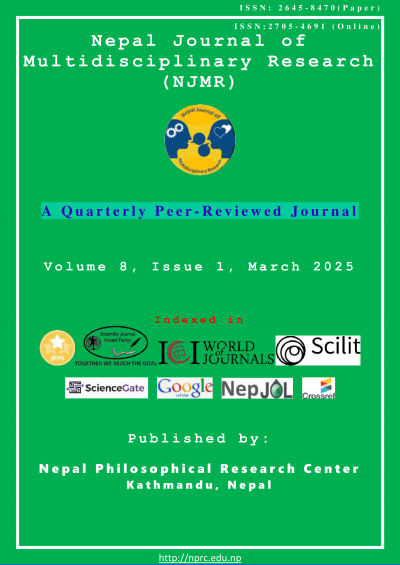Bridging Gaps and Building Futures of Policy and Practices: The Shift Towards Research-Driven University Education in Nepal
DOI:
https://doi.org/10.3126/njmr.v8i1.75820Keywords:
Digital transformation, higher education reform, industrial collaboration, inclusivity and equity, policy innovationAbstract
Background: This study explores the paradigm shift in Nepal's university education, focusing on reinventing policies and practices to address challenges like outdated curricula, inadequate infrastructure, and limited access to quality education. It aims to identify strategies for fostering innovation, inclusivity, and global competitiveness.
Methods: A qualitative research design with semi-structured interviews, focus group discussions, and thematic analysis based on Braun and Clarke's six-step process has been used. Data has been collected from stakeholders, including faculty, students, and administrators.
Results: Key findings highlight the need for policy reforms, equitable grant allocation, industrial collaboration, capacity building, and student-centric approaches. Challenges include resource constraints, regional disparities, and bureaucratic resistance. Opportunities lie in digital transformation, interdisciplinary collaboration, and internationalization.
Conclusion: Nepal's higher education requires comprehensive reforms to align with global standards and national development goals. Addressing barriers while leveraging emerging opportunities can create a dynamic, research-driven academic ecosystem.
Novelty: This study uniquely integrates policy reinvention, institutional restructuring, and digital transformation to address systemic challenges in Nepal’s higher education. Unlike previous research, it employs Braun and Clarke’s thematic analysis to synthesize multi-stakeholder perspectives, emphasizing equitable grant allocation, interdisciplinary collaboration, and student-centric policies. By advocating for marginalized institutional inclusivity and industry-academia partnerships, it offers a comprehensive, forward-looking framework for fostering global competitiveness and academic excellence.
Downloads
Downloads
Published
How to Cite
Issue
Section
License
Copyright (c) 2025 The Author(s)

This work is licensed under a Creative Commons Attribution-NonCommercial 4.0 International License.
This license enables reusers to distribute, remix, adapt, and build upon the material in any medium or format for noncommercial purposes only, and only so long as attribution is given to the creator.




